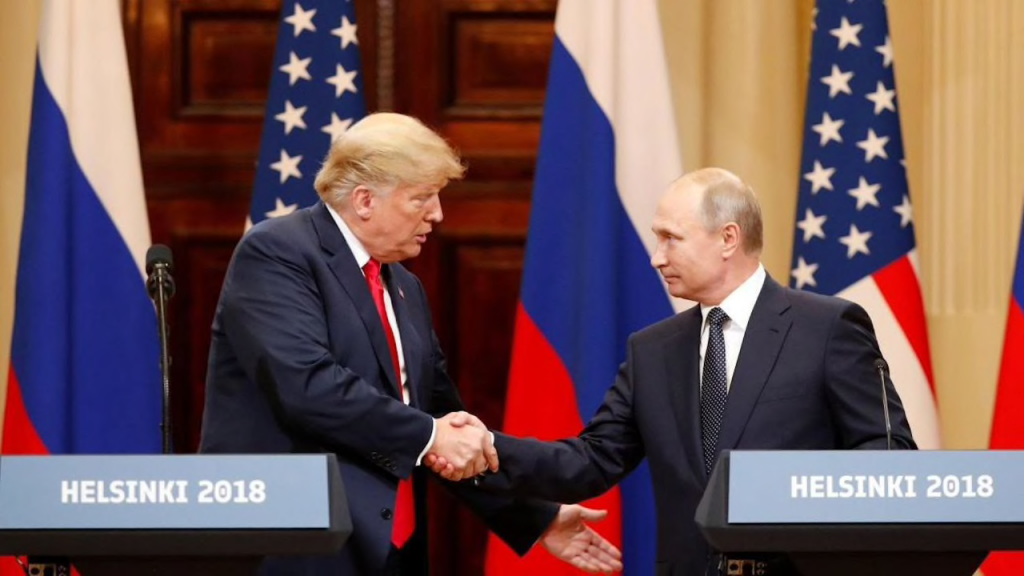Australia/Israel Review
Europa Europa: From Helsinki to Damascus
Aug 8, 2018 | Douglas Davis

US President Donald Trump was reviled by critics following the Helsinki summit with his Russian counterpart, Vladimir Putin, last month. Lost in translation was Trump’s assertion that the two men are planning to do “certain things with respect to Syria that have to do with the safety of Israel. In that respect, we absolutely would like to work in order to help Israel, and Israel will be working with us.” Later, he told Fox News: “We came to a lot of good conclusions, a really good conclusion for Israel… Putin is a believer in Israel.”
Implicit in the statement is that both leaders share Israel’s concern about Iranian intentions after the guns fall silent in Syria. Despite the blood and treasure that Teheran has spent defending Syrian President Bashar al-Assad, it seems unlikely that the mullahs will be permitted to consolidate their positions in order to extend their influence within the Islamic world and threaten Israel.
Such are not the concerns in Europe. The three European countries – Germany, France and Britain – which joined the American-led negotiations to produce a nuclear deal with Iran met in Vienna last month, along with their Russian and Chinese partners. Their mission: to discuss ways of circumventing the Trump Administration’s decision to pull the plug on the deal and resume full-blown sanctions against Iran in August.
The 2015 agreement, known as the Joint Comprehensive Plan of Action (JCPOA), was regarded by Barack Obama as a jewel in his presidential crown. It had been intended to lift sanctions, temporarily freeze Iran’s drive towards nuclear weapons and allay Israeli anxieties. In fact, it had the opposite effect. By the time Trump called a halt to the farce, it had become clear that the JCPOA was a dead duck. Still, the Europeans appear determined to be seen to be attempting to uphold the agreement, with or without the Americans.
At stake for the Europeans is the fact that renewed sanctions will mean foregoing billions of dollars’ worth of commercial opportunities. A great deal is at stake for the Iranians, too, who are in the grip of a disastrous economic downturn and growing domestic discontent. So serious is their predicament that Iranian officials have warned that unless the European Union is able to compensate for the economic loss of the JCPOA, Teheran itself would unilaterally withdraw from the deal.
While the Europeans are happy to play the role of appeasers, the Iranians are in no mood to reciprocate the goodwill. Just as the Europeans were preparing to gather in Vienna, an Iranian cell arrived with a different agenda: they were on a mission to conduct a major terrorist operation in France, which was masterminded and led by no less than Assadollah Assadi, a supposed diplomat at the Iranian Embassy in Vienna.
In the event, the plot was exposed and the cell’s Iranian members were arrested at locations in France, Germany and Belgium. At the time of their capture, they had explosives, detonators and other destructive devices. The diplomat, the Iranian agents and cell members are expected to face trial.
The question remains: why were the Europeans, themselves facing the threat of Iranian terrorism, so anxious to continue pursuing the path of conciliation, assuring Teheran they would move heaven and earth to persuade their nations’ industries to ignore the threat of an American boycott and continue trading with Iran? Because, they calculated, Trump will not be in office forever and they want to be first in the queue for contracts when, and if, a future American president decides to lift sanctions.
The Iranians, for their part, understand the game: the European leaders will go through the motions of trying to persuade their business leaders to resume trade, but they also know that the captains of European industry will refuse to oblige. They cannot risk allowing themselves to be added to the American blacklist. Instead, the Iranians will have to revert to using front companies in third countries with fake documents to disguise the real destination of the goods they purchase abroad.
While it is now widely assumed that the JCPOA is finished, attention is focusing on Iran’s ballistic missile development programme and its capacity for destabilisation, either directly from its bases in Syria or via proxies, like Hezbollah and Hamas – in the region and beyond.
Meanwhile, on the eve of the Vienna meeting, Israeli Prime Minister Binyamin Netanyahu set off on a lightning visit to key European capitals to lobby against capitulation to Iran. While he was in Europe, a tweet from Iran’s Supreme Leader, Ayatollah Ali Khamenei, declared Israel to be a “malignant cancerous tumour in the West Asian region that has to be removed and eradicated”. And the Ayatollah ordered his country’s atomic energy authority to step up industrial-scale uranium enrichment.
The Ayatollah’s vitriol unmasked Teheran’s real intentions. Less clear is how Israel will react. There was a hint from Netanyahu during a brief stop-over in Berlin: “Israel,” he told German Chancellor Angela Merkel, “will not permit Iran to gain nuclear weapons.”
With support from the US and Russian leaders, that appears to be a realistic prospect.






